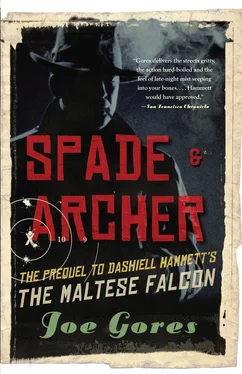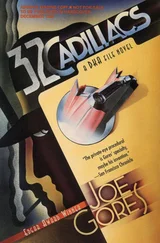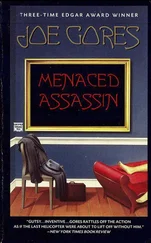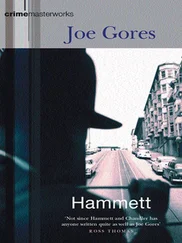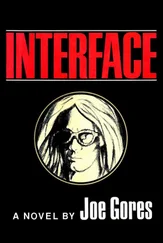The car ka-chunked to a stop. The driver’s door creaked open. Sam Spade stepped out. The salt tang of the bay filled his nostrils. He stood for long moments, his head swiveling like the head of a wary bear.
Satisfied, he put one hand on top of the wooden fence and vaulted over. Stood again, listening, watching. At the top of the unguarded gangway two shadowy figures materialized, one heavy, wide, slouchy, the other tall, narrow, quick.
“Where’s the gangplank guard?” asked Spade in an undertone.
“Down in the galley.” Grost used the same low tone. “We put them drops in the coffee urn like you told us; he’s sleeping like a baby. Last night in port, no one else is aboard.”
“The chest’s in the car. Let’s go get it,” said Spade.
The three stealthy figures hauled the obviously empty iron-bound chest up the gangplank, carried it awkwardly down to the promenade deck, opened it, set it under the bottom of the scupper that had clunked dully under Spade’s earlier tapping.
Grafton’s sheath knife dug out the plug. Down poured a shower of gold sovereigns. Spade grabbed the rope handle at one end of the chest, began backing toward the stairs, dragging it with him. The two seamen pushed from behind, then lifted it up step-by-step. On the boat deck above, Grafton unblocked the vent pipe. They hand-over-handed up a twenty-foot length of fire hose, its nozzle down. Spade tipped the open end of the hose over the chest. Another flood of gold coins poured down.
“Fifty thousand dollars in all,” panted Grafton in triumph.
They dragged the chest over to the gangplank, Spade carrying one end by its rope handle, the two seamen carrying the other. Spade seemed to catch his heel on something, lost his balance. He dropped his end of the chest on Grost’s foot; his flailing elbow caught Grafton on the side of his jaw. The chest broke open, gold coins spilled out.
There were sudden shouting voices, pounding feet, light from wildly waving electric torches. Uniformed bulls surged up the gangplank and came from the shadows on the deck. Tom Polhaus was in the forefront, directing them, his small shrewd eyes alight.
“We’ll have the devil’s own time to gather up all them coins, Samuel,” he said.
Spade growled, “What do you want, Tom? Pretty ribbon wrapped around ’em? Here’s something else: if I were you, I’d put divers off the stern of this ship tomorrow morning early.”
“Divers? What for?”
“To recover the two empty chests those birds dumped overboard after they hid the gold you just recovered by inspired police work.” He gave a sardonic laugh. “Unless Dundy is back at the hall working out ways to grab the glory.”
“Aw, c’mon, Sam,” said Polhaus almost sheepishly. “You know the sergeant’s a fair man in his own way.”
Spade said, “I’ll be in tomorrow to give my statement.”
Polhaus led his shackled prisoners down the gangplank as police officers on hands and knees gathered up the scattered coins. Spade melted into the shadow of the cabin, unseen, until the police and dockside onlookers below had dispersed.
Only then did he jerk aside the already-loosened canvas cover on one of the lifeboats slung on davits above the rail. He reached in and, one-handed, bodily hauled a squirming teenager out by his coat collar.
“Sorry to forestall your South Seas dream, son,” he said to “Henny” Hendrickson Barber, “but you’re worth money to me.”
Sam Spade’s left hand was about to replace the receiver when he heard Sid Wise’s sleep-thick voice in his ear.
“If the city isn’t on fire, I’m going to—”
“My office. Pronto.” Spade hung up.
He looked at the disconsolate teenager slumped across the desk from him, arms hanging limply outside the chair arms toward the floor. It was cold in the office.
“How much trouble am I in?” asked the boy finally.
Spade licked the paper of one of his hand-rolled, twisted the ends, put one end in his mouth, lit it. “With the cops, none at all.” He put a shrug in his voice. “With your folks—”
“How’d you find me?”
“I saw your clothes and food and books in a lifeboat.”
The boy fell silent. Spade smoked placidly. Henny finally said, “You sound like you tried it once.”
Spade chuckled. “I didn’t get any farther than you did. My old man whaled the tar out of me.”
“That’d be beneath Pater’s dignity. My ma will yell at me and then start hugging me. She never lets me do anything.”
Hurried steps pattered up the hall, came through Spade’s outer door without slowing down. Sid Wise burst in.
“Sam, what the devil are you...” He ran down, seeing the boy for the first time. He exclaimed, “Henny!”
“ ‘Lo, Mr. Wise,” said Henny despondently to the floor.
“Where’d you find him?”
“ San Anselmo.” Spade grinned wolfishly. “Got the gold, too, fifty thousand worth. Seventy-five is still missing. So is McPhee, so the case isn’t closed yet in my book.”
Wise gestured Henny out of the chair, fell into it himself. “You’d better tell me all about it. From the beginning.”
Spade pointed at the telephone.
“Call the Barbers. I’ll fill you in while you’re driving the three of us out to their estate to bring this desperado here home to his folks.”
Henny couldn’t hide his sudden grin at the description.
“You’ll be fighting off the girls with a stick at U.C. Berkeley, son.” To Wise he said, “I gave it to Tom Polhaus. The find, the takedown. By the time Dundy gets through shoving him aside, neither his nor my name will appear in the papers.”
Sid Wise reached across the desk for the telephone, chuckling to Spade. “Even so, we’re golden on this one, Sammy.”
“Sure.” Spade was on his feet. “I’ll get paid, Geaque will know who found the gold, and he’ll get the word out. It’ll do me good in the long run with the movers and shakers.”
. . .
When Spade entered the office at 7:30 the next morning, Effie Perine was already at her desk, the little jeweled gold locket she had been wearing on the day he hired her open before her. She had a wistful expression on her face.
Spade looked over her shoulder. Unfolded, the locket showed miniature photographs in a four-leaf-clover shape, each picture under a thin glass plate.
“Trouble?” asked Spade.
Effie Perine jumped, startled. “I–I didn’t hear you come in, Sam. No. No trouble. Just... memories...”
On the left was the cracked, faded portrait of a handsome Greek man with piercing, soulful eyes. He was dressed in the high starch collar and cravat of the previous century.
Spade said, “Your father?”
“Yes. Tassos Perinos. He died in the nineteen eighteen flu epidemic.”
The photograph across from her father’s was of a young woman, older now, whose face Spade knew well. “And your ma.” He looked at the lower one. “And their wedding picture.”
The top photograph was a tiny portrait of a Greek woman of twenty-two or twenty-three. It too had been amateurishly cut with nail scissors to fit the oval frame. It was too small to show much detail.
Effie Perine said, “Penelope Chiotras. Penny. She’s six years older than I am. Our parents came here together from Greece in nineteen hundred. Penny’s always been like a big sister to me. She took care of me for a year when my mother sort of fell to pieces after Dad died. I haven’t seen her for a year. I know she’s all right; she makes regular deposits in her mother’s account. But... nobody knows where she lives or works. I miss her.”
“I’d miss her too,” said Spade.
Decisively, she closed the locket and hung it back around her neck on its thin gold chain. Her mood had lightened.
Читать дальше
